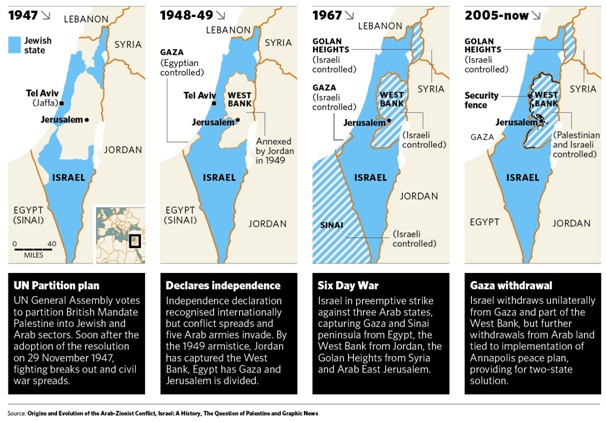Why in news?
- U.S. President Trump reversed the decades old policy, and recognised Jerusalem as the capital of Israel.
- The US administration would also begin a process of moving the U.S. embassy in Tel Aviv to Jerusalem.
What is the tussle with Jerusalem?
- Jerusalem is in ways symbolic of the Israel-Palestine conflict itself.
- The tussle centres on who gets to control the ancient city that is sacred to Jews, Muslims and Christians.
- After the end of the First Arab-Israel War in 1948, Jerusalem was partitioned into West and East, under Israeli and Palestinian control respectively.
- But in 1967, during the Six-Day Arab-Israel War, Israel snatched East Jerusalem from Jordanian forces.
- Israel’s Parliament also declared the territory had been “annexed to Israel” and Jerusalem had been “reunited”.
- The predominantly Palestinian population in the east lives under full Israeli control, but cannot vote in parliamentary elections.
- This marginalised the Palestinians, who wanted East Jerusalem to be their capital under the “two-state solution”.
- Israel was undeterred by the refusal of the international community to endorse the annexation.
- It further added over 200,000 Jewish settlers to the once-almost entirely Arab East Jerusalem.

- Meanwhile, in 2016, the UN reaffirmed that Jerusalem’s Palestinian territories were under “hostile occupation”.
- The international community considers east Jerusalem illegally occupied by Israel.
- Notably, foreign embassies to Israel are in Tel Aviv and not Jerusalem.
- India for its part has traditionally backed a two-state solution, and assured that the Indian embassy would stay in Tel Aviv.
What is the significance of the US's move?
- Jerusalem - Jerusalem is almost the key to stability of the entire Middle East.
- It has many shrines that are equally significant for the Jews, the Muslims and the Christians.
- Trump's move reflects Jerusalem as the centre of Jewish faith, and the fact that the city is the seat of the Israeli government.
- US - Trump expressed hope for start of the peace process and reiterated his commitment to the two-state solution to the Israel-Palestine conflict.
- The effort to please the core base of pro-Israel hardliners and the overwhelming Jewish population in US cannot be denied.
- But, as with most political developments in the Middle East, a bigger regional game could also be behind.
- This possibly includes a US-Saudi-Israel alliance against Iran, the common enemy.
- Response - The UN Secretary General voicing dissent had said that the issue on the holy city must be resolved only through direct negotiations.
- The Islamic world is outraged and many Arab leaders warned it could trigger an upheaval in the already volatile Middle East.
- Palestine has warned of dangerous consequences and said the decision was a declaration of war in the region.
- Neighbouring Jordan and Turkey have cautioned the US and have threatened to cut ties with Israel.
- Militant groups in the region could possibly take aggressive stances.
Source: Indian Express, The Hindu
